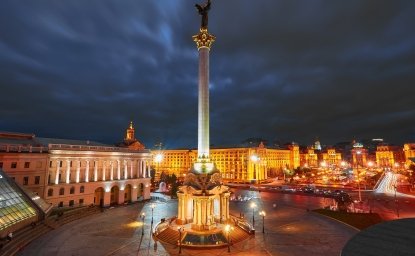
A blog of the Kennan Institute
In September, Russia started air attacks on Ukraine's power infrastructure. Since October 10, these attacks have become massive, happening almost every week across the country. According to officials’ statements, more than a half of Ukraine's power system is damaged. The power deficit is about 20 to 30 percent on average, but higher in some regions, like 33 to 38 percent in Kyiv.
Damage and lack of capacity have resulted in the need to introduce rolling blackouts and electricity cutoffs for 4 to 12 hours, or even longer, every day. Industries are suffering from power shortages as well, which affects the economy, already impacted by the war.
Massive attacks and problems with the power supply have led to discussion, both in Ukraine and abroad, about the risk of a humanitarian disaster in winter if the system is more damaged or a blackout happens. There is also concern about further migration. No electricity will mean water and heat supply systems will not operate. Sewage systems are also driven by electric pumps. After an attack on November 23, for example, a blackout in Kyiv meant that many customers were without power, water, and heat for 2 to 3 days, with a very weak cell connection and no internet.
Suspension of water-containing systems in frosty weather for a couple of days will mean frozen pipes later, cracked with ice inside, which will make them unusable, at least until summer. So, numerous big cities may find themselves without essential services and people without heat, electricity, and water supply. And it will be impossible to quickly evacuate millions of people from such cities. The World Health Organization emphasized in a November 21 statement that cold weather can kill and the winter will be about survival for people in Ukraine.
Partnering countries are looking for solutions to help Ukraine to cope with the looming crisis. They are sending Ukraine autonomous generators, spare parts and equipment to repair damaged infrastructure, and more air defense systems to protect the power systems from new attacks.
But the need for all this aid could have been less if Ukraine had received air defense systems earlier. Ukraine requested those a long time before these attacks on the power infrastructure—in spring and summer. And analysts in Ukraine anticipated attacks on the power system. But the turning point came on October 10, when Russia struck the power infrastructure in 12 oblasts, causing severe damage and temporary cutoffs in many cities.
The day after the attack, Ukraine had to suspend electricity exports to Europe. The EU, suffering from the energy crisis caused by Russia, is trying to save gas and electricity. And relatively cheap and carbon-neutral electricity imported from Ukraine was helping. Later, the EU and other Western nations looked for and supplied equipment to help with repairing the power infrastructure, as Ukrainian energy companies were running out of stock of this equipment. Western states also promised additional financial aid and direct electricity supplies to help withstand Russian attacks.
So Ukraine has received the air defense systems it was asking for, but unfortunately only after serious damage to its power system. Together with this military aid, the West is now funding other aid and lost electricity imports. But the damage to the power system could have either been prevented or its impact lessened if this aid had been given earlier. In March or April, millions of citizens in Ukraine would not have been at risk of freezing. And the West would not be concerned about a new possible wave of migrants.
To make a long story short: if air defense aid had been provided earlier, all would have benefitted. This also applies to other aspects of military aid. Right after the invasion, Ukraine needed more weapons to defend itself. But it took weeks to start receiving crucially necessary arms and equipment. Even worse, some Western government officials were skeptical about Ukraine’s capabilities to defend itself and predicted a quick defeat for Ukraine. Ukrainian ambassador Andrii Melnyk told the story in March of how German Finance Minister Christian Lindner was against supplying weapons to Ukraine, expecting the country to fail within hours.
History does not tolerate a subjunctive mood—and yet. If Ukraine had received the necessary aid in time, we probably would not have seen massacres in Bucha; thousands killed, kidnapped, and moved to filtration camps in Mariupol; an occupied Zaporizhzhia nuclear power plant; and the losses Ukraine sustains now as it liberates the territories occupied by Russia in the early weeks after the invasion. He who hesitates is lost.
The opinions expressed in this article are those solely of the author and do not reflect the views of the Kennan Institute.
Author

Director, Energy Program, Ukrainian Institute for the Future

Kennan Institute
The Kennan Institute is the premier US center for advanced research on Eurasia and the oldest and largest regional program at the Woodrow Wilson International Center for Scholars. The Kennan Institute is committed to improving American understanding of Russia, Ukraine, Central Asia, the South Caucasus, and the surrounding region through research and exchange. Read more

Explore More in Focus Ukraine
Browse Focus Ukraine
Ukrainian Society Under Occupation: Hardship and Civic Resilience

Creating Rules of the Game for Contemporary Ukrainian Theater

Ukraine Between 1991 and 2022: The Problem of the Blank Canvas

